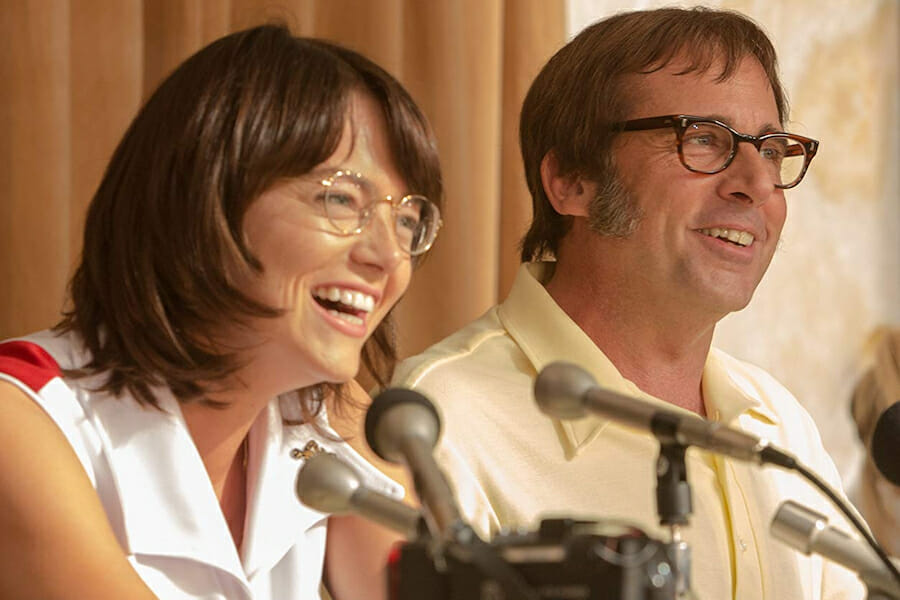
‘Battle of the Sexes’ Review
At least two generations are too young to have experienced the 1973 media circus that was the tennis match between Billie Jean King and Bobby Riggs. However, what matters is that the impact and social changes that began in earnest that night at the Astrodome are still being felt and are evolving today. It might seem incredulous that the 29-year old top-ranked women’s player emerging victorious against a 55 year old who played his last professional match 14 years earlier would have an impact on anything other than TV rankings, but in fact, it caused a significant societal shift.
Real life married couple and co-directors Jonathan Dayton and Valerie Faris are well known for their collaborations on iconic music videos and TV commercials and since joining the movie world have brought us Little Miss Sunshine and Ruby Sparks. Their talent for visual presentation is on display here in Battle of the Sexes, both in the tennis scenes and the more intimate character moments. And, oh my, there are some intimate moments thanks to the script from Oscar winning screenwriter Simon Beaufoy (Slumdog Millionaire). There is no shying away from Ms. King’s sexual confusion/awareness/preferences.
Emma Stone (Oscar winner for La La Land) stars as tennis legend Billie Jean King and manages to convey three different sides: the ultra-competitor, the champion for equal rights and the married woman coming to grips with her sexual identity. Steve Carell captures the essence and mannerisms of Bobby Riggs, the former tennis champ, floundering in middle age and always on the lookout for his next hustle or gambling opportunity. Surprisingly, only a minor portion of the film deals with the actual tennis match. Instead, the film dives into the personal lives of these two polar opposite personalities, each with their own challenges and issues.
Despite the fun and outrageousness that the Riggs character delivers, the film might have been better served focusing even more on Ms. King. While she needed the “villain,” it was really her dedication to the cause and strength amidst the backlash that made the difference, along with her court skills. Watching her stand tall in confrontations with the chauvinistic and powerful Jack Kramer (Bill Pullman) is something to behold. Again, those that weren’t around might not believe some of the outrageous claims made by the men of the times.
Supporting work comes from Andrea Riseborough as the all-important Marilyn, who turns Billie Jean away from her husband Larry (Austin Stowell), Sarah Silverman as promoter Gladys Heldman, Natalie Morales as Rosie Casales, Alan Cumming as the colorful clothes designer, an underutilized Elisabeth Shue as Riggs’ wife, Fred Armisen as Rheo Blair – Riggs’ partner in the herbs and vitamins game and Lewis Pullman (Bill’s real life son) as Riggs’ son, Larry. We are even treated to a Bob Stephenson sighting as the Sugar Daddy PR guy at the match.
This was the era when the Vietnam War was winding down, the Watergate scandal was raging, non-heterosexual preferences were kept in the closet, prize money for men’s tennis was 8-10 times that of women, and the overall respect for women and their sports was excruciatingly misguided. Listening to Howard Cosell speak so condescendingly during the national broadcast merely confirms the inequity. Of course, these same issues are discussed and debated even today, as society’s evolution is often slow, even when moving in the right direction. The film might not add much to today’s cause, but it reinforces the early legacy of Billie Jean King as a change-maker.

